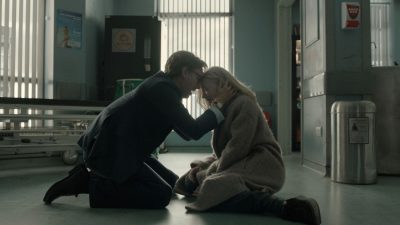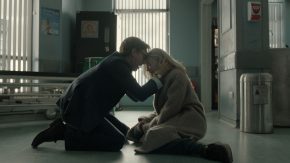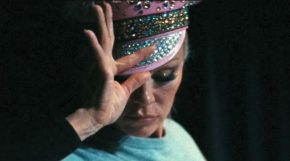We – unlike most people – are forced to prove even more, suffering the same fate. Ensuring safety of life for our children is painful as we are driven to go against the current.
How to struggle to live from hand to mouth because of their deplorable circumstances is a key concern for Rom mothers languishing on „pittances” provided by the „system”. Thanks to the docudrama Éljen soká Regina! (Live long, Regina!), performed by SajátSzínház, there is a front seat to take in order not to turn a blind eye to this issue any longer.
Eight Gypsy women, coming from a quite deprived village named Szomolya, play in this drama telling some stories unfold their own experience. Besides them, Fruzsina Háda (Utas és Holdvilág) appears in the performance.
How was the performance received by the provincial rom communities? Can talking about problems actually change how they feel? Among other things, we were trying to get the bottom of these issues by asking Fruzsina Háda and Renáta Báder.
Maternity is the main topic of Live long, Regina!. What made the story taken from life a piece?
F.H.: The women tell their own stories in the play. A kind of art therapy was the first phase of the process: their revealed memories were worked up through digital storytelling. An action method. Psychodrama, conducted by Judith Teszáry was the second phase that helped us engulfed and took the different aspects and narratives. The next phase was working out the drama itself taken over by Edit Romankovics (director) and Eszter Gyulay (dramaturgist). That was the point when the first script and the storyboard of Live long, Regina! was born. After all, it became obvious that the seed of this play must be motherhood and the question how to protect our children.

(c) Csoszó Gabriella
What do you mean by digital storytelling?
F.H.: True and very personal stories (e.g.: from the dispensary or bureau), sort of tangible nuisances were recorded and completed with photos and music, chosen by them.
R.B.: The dzuvels of Szomolya pour their anguish; even their deepest ones. It was 15 years ago when I lost my 16-month-old daughter. During the digital storytelling I recalled how the doctors treated her, how she was treated by the hospital.
Renáta, what did recalling the loss of your daughter make you feel?
R.B.: Coming to grips by telling them all helped a lot, was a bit of a relief, actually. Over and above, was a kind of compassion for those who’d suffered things like that. That’s why we performed in countryside settings, too.
F.H.: Vivid conversation with the audience of Live long, Regina! after each performance was proved a kind of „buoyant force” in those deprived settlements we’d been visiting for months before showing up in Trafó.
R.B.: As feedback shows, the piece was encouraging and made the oppressed and those who’re suffering stand up for themselves. And in Trafó those who are not unfounded could also get intimately familiar with our specific, socially disadvantaged situation.
F.H: Apart from the venue, the interactive post-performance conversation managed to deliver the message. Regina can open up those locked gates!

(c) Csoszó Gabriella
What are the roles you act in the play?
R.B.: I portray the 50-year-old Regina whom her friends are waiting to come home to wish her a happy birthday. I don’t speak, but sing songs depending on the mood, at times jolly songs, full of spirit or laments.
F.H.: I play the role of a character who is neither a gypsy nor a mother, an outsider full of questions. Getting familiar with the women’s stories.
Improvisation must be crucial element! How do you rehearse?
F.H.: All of the scenes come from improve that gave the script, a sort of frame that gives the chronologic order of the scenes not an obvious scenario. Dialogues vary with each play. The plot opens in a kitchen, waiting Regina to come home to celebrate her 50th birthday, cooking, chatting, recalling stories from her life just as life is governed by its own law.
Judging from what you’ve said the troupe has crossed over emotionally as well.
F.H.: Definitely! Rehearsals take a sip of fun.
R.B.: Living in the same village doesn’t mean us to hang out together around the clock. Rehearsing gives us good vibes, can’t be put into words how it feels to resonate, crying, grieving, laughing together, engulfed with sympathy comforting each other. Hopefully, we can make others believe… It is at this low point in your life that a beam of hope begins to shine when together we stand.
F.H.: We have a mission; each performance pursues closer ties.

Actresses of the play. (c) Csoszó Gabriella
The Roms’ socially and politically disadvantaged situation raises a considerable number of questions. What do you think the current government should do to extricate the Gypsies from this difficult situation? How far do you think others’ responsibility reaches?
F.H.: This performance can’t put an end on the debate, it’s an exclamation mark. Not only gypsy women are exposed to risks and constraints in question. Whether it comes up in healthcare or bureau, hardships in life are waiting all of us to overcome. Gypsies however must protect their children from violence and abuse coming from discrimination too.
R.B.: Society must come to its own conclusion. I am forced to prove more, just like any of my counterparts. Ensuring safety of life for our children is painful as we are forced to go against the current. Viktor Orbán ought to see our performance!
F.H.: It is way too long to enumerate how much a respectable political system should be doing in order to heal the current healthcare and social care systems, to say goodbye to the conception in which the roles of victim and perpetrator are reversed for the benefit of a patriarchal society.
Does Live long, Regina! have its own audience abroad?
F.H.: We got invitation from several places, among others, from Transylvania and Germany. We try to understand how to act like a kind of „socially sensitizing” ambassador. Delivering our message – that’s our core mission to accomplish.
Interview: Zsolt Várkonyi
Translation: Nóra Fehér



























Comments